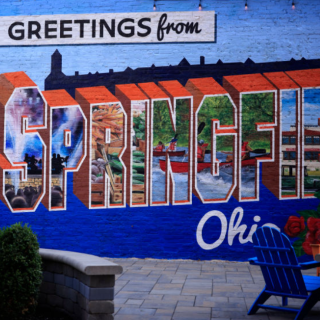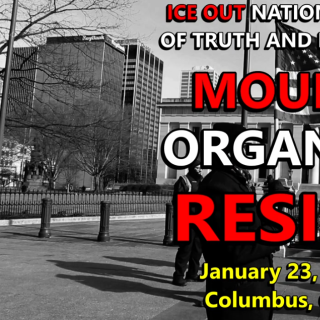Human Rights Day – December 10
On December 10, 1948, the Universal Declaration of Human Rights was adopted by the United Nations General Assembly. Since 1950, countless events have been held to observe Human Rights Day on December 10. Among such events planned this year are two in Columbus, Ohio:
Jim Leonard and Dan and Barbara Lehman will present their reflections as participants in a Christian Peacemaker Teams delegation to Palestine/Israel, hosted by Central Ohioans for Peace (Columbus Mennonite Church, 35 Oakland Park Ave., 43214), 7-9 PM.
Human Rights Columbus’s celebration of Human Rights Day, recognizing “Columbus Human Rights Champions” Esther Flores, Dureti Mimi Tadesse, and Bill Pelke (First Congregational Church, 444 E. Broad St., 43215), 7-9 PM. The two events, we believe, may serve as examples of attempts to liberate the idea of human rights.
A History of Human Rights
Why is the idea of human rights in need of liberation? Because “[t]o a startling extent, human rights have become prisoners of the contemporary age of inequality,” to use the words of Samuel Moyn, a professor of law and history at Yale University, from his book Not Enough: Human Rights in an Unequal World. As shown in Moyn’s earlier work The Last Utopia: Human Rights in History, the idea of the Rights of Man was first born as a justification for revolution and sovereignty, “invoked by a people to found a nation-state of their own, not to police someone else’s.”
The revolutionary struggle in eighteenth-century France in particular gave the idea a “Jacobin legacy” of social justice. The idea was given an American inflection through the struggle to overcome the Great Depression in the United States, belatedly culminating in FDR’s Second Bill of Rights in 1944. The social and economic rights thus elaborated in crucibles of crisis still found expression in the Universal Declaration of Human Rights. However, those social and economic rights – especially those rights that Americans have yet to enjoy, such as “the right to a standard of living adequate for the health and well-being of himself and of his family, including food, clothing, housing and medical care and necessary social services” – are precisely the ones downplayed by the most powerful human rights NGOs today.
Worse yet than the neglect of social and economic rights is the fact that the rhetoric of human rights has been hijacked, time and again, to promote imperialism. Among the most brazen examples of that in recent history may be Avaaz’s petitions for “no-fly zones” (read: US bombings) in Libya and Syria. Subtler than public petitions for war, yet equally pernicious, is the consistency with which Human Rights Watch, to take the most glaring example, follows the US government’s political agenda, for instance, creating a false impression that right-wing governments like Brazil’s and Colombia’s that are allied with US imperialists are better for human rights than left-wing governments like Venezuela’s. The shared perspectives between the US government and NGOs like Human Rights Watch are no coincidence, for the latter are “non-governmental” in name only. As Keane Bhatt meticulously documented in NACLA, there exists “a revolving door” recycling former “high-level governmental bureaucrats” from the State Department and even the CIA into Human Rights Watch.
In other words, imperialism and its ideologues have turned the world upside down: a revolutionary idea for popular sovereignty has been expropriated and turned into a counter-revolutionary idea against it. The Universal Declaration of Human Rights itself, as a matter of fact, already harbored a contradiction that lent itself to this ideological inversion. Article 2 of the Declaration, referring to the colonized among others, says, “no distinction shall be made on the basis of the political, jurisdictional or international status of the country or territory to which a person belongs, whether it be independent, trust, non-self-governing or under any other limitation of sovereignty.” It is striking that the Declaration promises non-discrimination between citizens of empires and subjects of their colonies and yet fails to proclaim freedom from colonialism a human right.
Decolonize Human Rights
Hence the aforementioned necessity, paradoxical as it may sound, to liberate human rights – first and foremost from the shackles of imperialism. It is high time to begin the work of decolonizing human rights. What better way to do so than learn from Christian Peacemaker Teams and fight for the rights of Palestinians, still oppressed by anachronistic, old-fashioned colonialism, or learn from local activists fighting against the deprivation of human rights taking place right here in our own city?



